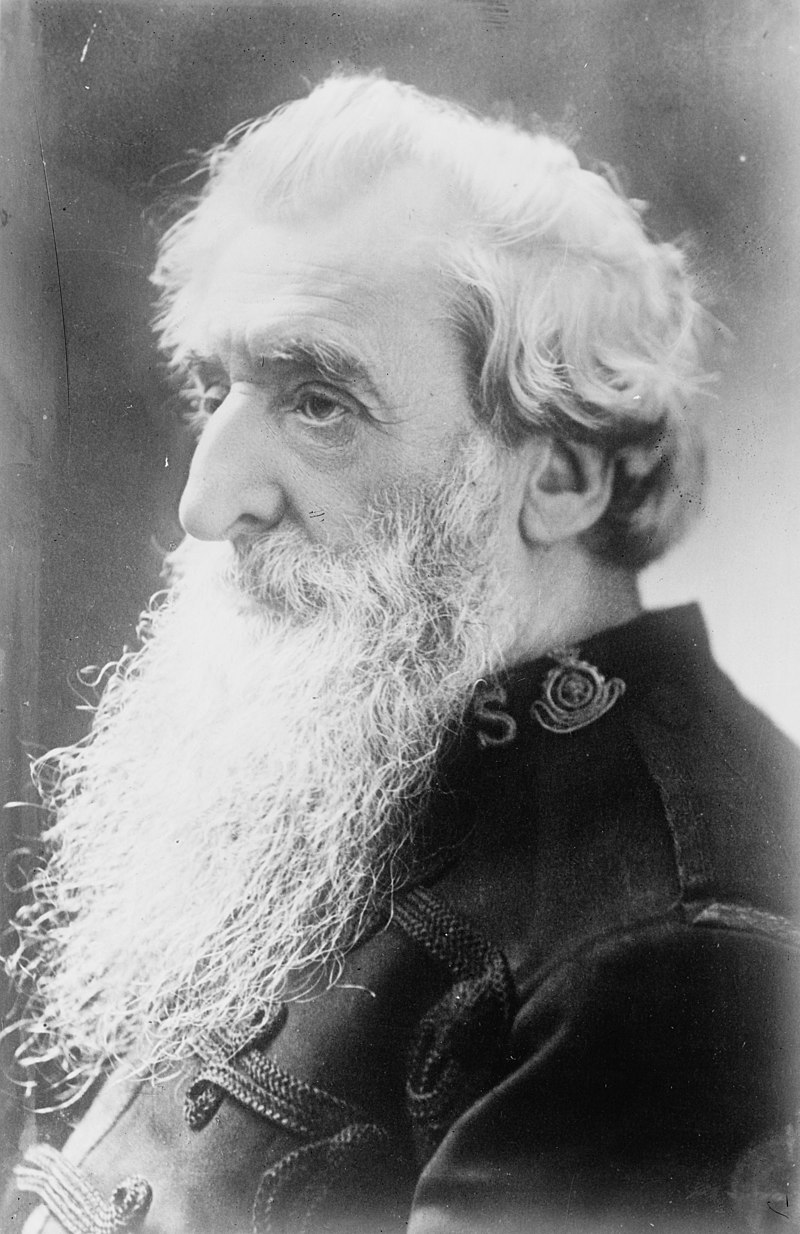William's Fear
Topic: Thoughts on Psalm 49
Presenter: Christiaan de Ruiter
Document Title: William's Fear
A song, titled “How Precious is the Ransomed Soul,” written by Mother and Son Krommenhoek from the Netherlands, has been resonating in my  mind for a considerable duration. The profound notion embedded in this simple sentence has been recurring.
mind for a considerable duration. The profound notion embedded in this simple sentence has been recurring.
Recently, my friend Femmy from the Netherlands shared a picture of the Salvation Army founder, William Booth, accompanied by a quote that reads: “The chief dangers which confront the coming century will be religion without the Holy Ghost, Christianity without Christ, forgiveness without repentance, salvation without regeneration, politics without God, and Heaven without hell.”
This quote has gripped my consciousness, compelling me to share it. These words encapsulate my deep concern and grief for our nation, leadership, churches, and society at large.
The Salvation Army and Early Charismatic Movement
In its early days, the Salvation Army was akin to a Pentecostal organization, although not explicitly labeled as such. It could even be considered an early form of the Charismatic movement. I believe it is crucial for them to return to these roots, despite some contemporary perspectives that might dismiss certain manifestations of the Holy Spirit.
Our Troubling Times
This year has been fraught with challenges not only globally but personally for many individuals. People's lives have been impacted negatively in various ways. I see this as a reflection of William Booth's words – our world is losing its true focus.
John Adams, in a message to the Officers of the First Brigade of the Third Division of the Militia of Massachusetts, stated: "Our constitution was made only for a moral and religious people. It is wholly inadequate for the government of any other.”
The Complexity of Modern Religion
Today, there is confusion about different religious traditions, including various Christian denominations. The true purpose of religion is often overshadowed by the institution itself. This trend is concerning, as it diverges from the essence of faith.
William Booth's observations, articulated in the 1800s, resonate even now, as morality has become relative, and genuine repentance has lost its significance.
A Plea for Authentic Faith
The translated Dutch lyrics of the song I mentioned say, “One soul is worth much more than anything on this earth.” Is this still true for the modern Christian?
William Booth expressed his readiness to appear foolish if it would save a soul. Would we do the same?
Psalm 49:9 (TLV) reads:
“For the redemption of a soul is costly—so, one should stop trying forever.”
If we isolate this verse, it might seem we are finished with our message, yet we must explore the context and allow God's words to convict our hearts.
Psalm 49: A Universal Message
Rich and Poor Alike
For the music director: a psalm of the sons of Korah.
2 Hear this, all you peoples. Give ear, all you inhabitants of the world,3 both low and high, rich and poor together.
4 My mouth speaks wisdom, My heart’s meditation is understanding.
5 I will turn my ear to a proverb.
I will utter my riddle on the harp: 6 Why should I fear in evil days?
when the iniquity of my deceivers surrounds me?
7 Or those trusting in their wealth, boasting about their great riches?
8 No man can redeem his brother, or give to God a ransom for him.
9 For the redemption of a soul is costly— so, one should stop trying forever.
10 Will he live forever— and never see the Pit?
11 Surely he must see, even wise men die.
The fool and the brutish will alike perish, leaving their wealth to others.[a]
12 Their inward thought is: Their houses are eternal, their dwellings for generation after generation.
They name their lands after themselves.
13 But the pompous man will not endure— he is like the beasts that perish.
14 Such is the way of the self-confident, and their followers who approve their sayings. Selah
15 Like sheep they are destined for Sheol.
Death will be their shepherd and the upright will rule over them in the morning.
Their image will decay in Sheol— far from its lofty place.
16 But God redeems my soul from the power of Sheol— for He receives me. Selah
17 Do not be afraid when a man gets rich, when his house’s splendor increases.
18 For when he dies he takes nothing away.
His splendor will not follow him down.
19 Though during his life he congratulates himself, and men praise you when you do well for yourself— 20 He will still join his fathers’ company, who will never see the light.
21 A pompous man, without understanding— he is like the beasts that perish.
Psalm 49 speaks not just to a specific people or era but for all times and all individuals. It beckons us to listen carefully and offers wisdom.
We must ask ourselves why we should fear what William Booth talked about. Our churches, constrained by time and ritual, often restrict the movement of the Holy Spirit.
God's Desire for Communion
We have a loving, mighty, and powerful God who desires communion with us. Time spent in the Holy Spirit is time spent with God.
John 14:16-17, 26-27 (CEB) assures us:
“I will ask the Father, and he will send another Companion, who will be with you forever [...] Peace I leave with you. My peace I give you. I give to you not as the world gives. Don’t be troubled or afraid.”
Verse 6 of Psalm 49 asks why we should fear, and Verse 27 of John 14 answers with Jesus's words, "Don't be afraid."
Knowing the Holy Spirit
 Why must we comprehend the Holy Spirit? Because the Ruach Ha'Kodesh—meaning "the Breath, the Spirit of God" in Hebrew—has been given to us. Many fail to recognize this divine force, leading to fear and confusion in the face of worldly events. Lack of understanding of the Spirit of God makes us more vulnerable to fear, unable to compare our mortal struggles to His almighty power and strength.
Why must we comprehend the Holy Spirit? Because the Ruach Ha'Kodesh—meaning "the Breath, the Spirit of God" in Hebrew—has been given to us. Many fail to recognize this divine force, leading to fear and confusion in the face of worldly events. Lack of understanding of the Spirit of God makes us more vulnerable to fear, unable to compare our mortal struggles to His almighty power and strength.
A. The Reality of Faith with the Holy Spirit
The presence of the Holy Spirit can be seen in those who face grave challenges, such as the Christians martyred by ISIS. Their calm reflects the eternal strength of Christ within them. William Booth aptly stated that faith without the Holy Spirit is empty. Without this connection, fear takes over, as illustrated in verses 6 to 9.
B. The Sin and Redemption
We live surrounded by sin, whether it's our own or that of our loved ones. Within God's covenants were rituals for soul redemption, many of which have been lost. We may question our connection to these covenants, but they continue to be sealed by the blood of Yeshua. Through His sacrifice alone, we are saved from eternal damnation.
C. Accepting the Covenant
Each person must individually accept Christ's covenant. William Booth understood this, recognizing that it's the task of the faithful to bring others to God's love and forgiveness. Current trends in Christianity that focus on feel-good messages instead of repentance threaten the true path.
D. Riches, Comfort, and Sin
We must recognize that being comfortable in sin is the real wrong, not wealth itself. Sin in all its forms—lying, cheating, perversion, and more—is an affront to God. True repentance requires a complete turning away from sin.
E. The Importance of Repentance
Booth's warning of "Forgiveness without Repentance" rings true. Salvation needs regeneration. It requires a continuous process of striving for holiness. Churches that offer salvation without regeneration fall into the trap of a religion without Christ.
F. Leading People to God's Truth
Our hearts must guide us to lead people to Messiah Yeshua. It's a task to be taken on by each believer, one soul at a time. The preciousness of a ransomed soul outweighs all earthly value.
G. Politics and Salvation
Politics without God reflects a societal issue that begins with individual salvation. Progress must be made one step at a time, valuing each soul.
Heaven, Hell, and the Comforter
Heaven without Hell is a delusion, stemming from the misconceptions Booth outlined. We must be thankful for the guidance of the Holy Spirit, the Comforter promised in John 14:16, to lead us on the path of righteousness.
Sermon Notes by Pastor Christiaan J. de Ruiter are licensed under CC BY-NC-SA 4.0
Note: The content provided here represents the foundational notes for a sermon or teaching, and should not be misconstrued as a complete transcript or a fully articulated sermon.
It is our profound belief that the Holy Spirit operates through the preacher, guiding and inspiring the delivery to resonate with the needs and convictions of the congregation.
These notes typically form the basis for a 30 to 45-minute sermon or teaching, allowing the Holy Spirit's guidance to shape the specific message and application to the gathered believers. The essence of these teachings is not merely in the written words but in the inspired delivery and connection with the congregation, led by the Spirit.







